#I’m sure it was an editorial miscommunication (???) but to make it make sense
Text


“If Death be My Destiny!” Spectacular Spider-Man (Vol. 1/1976), #227.
Writer: Tom DeFalco; Penciler: Sal Buscema; Inker: Bill Sienkiewicz; Colorist: John Kalisz; Letterer: Clem Robins
#Marvel#Marvel comics#Marvel 616#Spectacular Spider-Man#Kaine#Kaine Parker#Scarlet Spider#Ben Reilly#I’m…carefully ignoring (in the way that reading comics sometimes necessitates) that Kaine went from:#“a really nice lady taught me to value all life (including my own and other clones’)”#to back to “they can’t die if they were never really alive in the first place” in the non-existent time jump between two issues#I’m sure it was an editorial miscommunication (???) but to make it make sense#I wonder if Kaine somehow had deduced that these were the not fully formed clones that Ben horrifically learns only later in this issue#(in what somehow manages to be one of the most (personally) unsettling scenes in Spider-Man comics and has managed to stick with me#long after I finished my read-through#as well as what I think might be the first time we see someone throw up on-panel in a Spidey comic (poor Ben))#but anyway that would be in addition to Kaine’s own angsty explanation for why he’s literally cracking heads together#which provides some funny imagery along with Ben palming another clone hahaha
2 notes
·
View notes
Note
Can you explain the appeal of Julian Blackthorn? This is a genuine question because I read the books and came away utterly bored by him and unconvinced of his moral greyness as opposed to like, Adam Parrish’s. He seemed so one dimensional to me but I want to know if I’m Wrong TM considering I tend to be very very biased toward my favourite characters and bored by the rest, and my favourites were Mark and Kieran. So maybe I just didn’t pay him enough attention??
it’s been a while since i wrote any earnest tsc meta but cringe culture is dead and the chance to infodump about my julian thoughts has me vibrating where i’m sitting so. yes okay.
technical stuff
(aka: things pertaining to How The Story Is Constructed)
cassandra clare’s characterization has become much stronger just in general since she first began writing the series like twenty years ago
perhaps most importantly: the more recent stuff i’ve read from her has involved characters who actually grow, change, and learn from their past mistakes
rather than repeating the same stupid decisions over and over again
and over and over and over some more
seriously take a shot every time someone in tmi miscommunicates or self-destructs in ways They Have Learned Not To Do for no real reason. u will die of alcohol poisoning
in tda this shines ESPECIALLY with the evolution of mark, kieran, and cristina’s relationship, but that’s a separate post
clare’s trademark is also the angsty traumatized jerkass love interest with a secret heart of gold
the woman is almost singlehandedly responsible for draco in leather pants and the proliferation of this kind of character type in fandom and teen lit. this isn’t a criticism it’s me marveling at how if you commit hard enough to a single trope you truly can change the world. follow your dreams
sad jackass with a heart of gold isn’t an Inherently Problematic Character Type
but poorly done it can lead to relationship dynamics in which one partner is constantly being hurt by and then forgiving the other despite them making no real effort to change, because they are narratively absolved due to being sad
(there’s a lot of this with earlier jace content. in some ways i think will was later created specifically to be a same-archetype protagonist who actually does get called on his shit and grow. that’s also another post)
also if all of your sexy male love interests are tortured jackasses with a heart of gold then people start calling you a one-trick pony
enter julian blackthorn!
from the very start everything about him is designed to be the INVERSE of the heart of gold jackass. which immediately makes him interesting just from a meta perspective
(mark and kieran are also both alternate angles on this time-honored archetype. mark gets the heart of gold and kieran gets the jackass and then they’re both much more deeply messy than that. yet another post)
julian is kind, self-sacrificing, empathetic, artistic, emotionally supportive, responsible, and favored by old grannies everywhere
so a completely nonthreatening milquetoast guy, right
immediately forgettable if you’re only here for the dramatic conflicts and shithead antics of clare’s other protags
except that he is A Mess
and that he has structured his priorities very carefully, and they are as selfless as you expect from The Hero (TM) but they are also Not Heroic (TM) and they do not align with the moral framework The Hero (TM) is supposed to use
moral ambiguity in characters always exists in relation to their narratives imo. you mention adam parrish - trc’s narrative already mucks around in different ethical shades of gray, and adam falls on the canon scale about where julian does on his canon scale. both more willing than the average pov character to do the ruthless thing or make the fucked-up choice if the ends justify the means; both with an intensely strong sense of internal priorities that they adhere to at all costs, both so unbelievably fucking down for murder; etc
i do think there are ways julian’s choices could have been pushed even further, but considering the number of readers who hate his guts already, i can see why clare opted not to go for the most controversial possible conflicts
so we’re flipping the narrative
instead of seeing this angsty bad boy and peeling back the layers of his trauma to find his heart of gold, we’re seeing the put-together selfless family man and peeling back the layers of his Responsibility Mask to expose the rotting husk underneath
MMMMMMMMMMMMMMM
THAT IS FUN AS FUCK
then when julian DOES lash out in hurtful, uncontrolled ways, he has significantly more narrative justification for it than most of clare’s protagonists (will elaborate in characterization thoughts)
julian is also interesting as fuck because of how his struggles allow for a more in-depth look at the failings of shadowhunter society, something that’s also sorely lacking in clare’s earlier work
his apparent amorality is simply the result of him making pragmatic and impossible choices because he has been faced with fucked-up ethical dilemmas since age 12 Because Society Has Failed Him
which opens the door for narrative exploration of how and why he’s been failed so badly & what needs to change
i also love that he has such a coldly calculated way of analyzing situations and allowing harm to occur when need be, bc a lot of clare’s early protagonists have such a bad case of Rush In And Get Myself Killed Because I’ve Got Feelings About Impulsive Heroism syndrome that i wanna push them in front of a truck
probably there’s other meta narrative stuff i could say but i’m stopping myself and moving on to character analysis
characterization stuff
(aka: reasons why i’m also attached to him in a vacuum)
i don’t read him as one-dimensional at all tbh
u may feel the narrative pushes “ruthless julian blackthorn” too much without delivering enough actual ruthless julian But i don’t think that’s the same as having only one dimension
from the get-go, the big question centered on julian is always “how far are you willing to go?” and the narrative pushes the stakes slowly higher and higher to continuously test julian’s “the price is always justified” mindset
he has a far more layered and realistic response to trauma than clare’s early protagonists - trauma affects every single aspect of his personality and how he conducts himself, and the effects vary depending on the circumstances
his conviction that he has to be the perfect parent to his siblings because they will fall apart if they see him show weakness?? rooted in how he feels like he’s fallen apart since losing the stable adult support he once relied upon
his willingness to hurt semi-innocent people, commit coldblooded murder, manipulate people using political leverage, allow harm to befall any stranger if it protects his family?? rooted in how he has already had to ask himself how much he’s willing to sacrifice, and how his family is his only source of stability when the world has never done Shit for him
his conviction that he has a darker heart than anyone else because he killed his possessed father, even though intellectually he knows he was saving his brother’s life?? rooted in having no means of processing this trauma and being unable to voice his feelings for fear of backlash from a deeply non-understanding society
the way he represses every single negative emotion he ever has, to the point where emma - his actual literal magic soulmate who can feel his emotions - is startled to find him hurting or angry?? once again all about how he has to be the perfect father or he’s failed completely
the way his anger is so totally disproportionate to different situations and the way his negative emotions can only come out in completely uncontrolled breaks?? all that repression baybey. this kid has not processed a single bad feeling in five years. every single real grievance and petty annoyance has been festering indefinitely inside him like a slowly spreading infection
julian’s arc involves him needing to get thru being his worst self to actually start to heal
as in, he has to actually learn to acknowledge his feelings, take care of himself, lean on his family, and let other people take some responsibility
he also has to learn that in his quest to be the perfect emotionally controlled authority figure, he has not actually learned how to control or deal with his emotions. like. At Fucking All. good god
the narrative setup is also about asking “how far are you willing to go?” until the answer is finally “not this far. not this far”
and once he reaches that point, he has to reevaluate everything about how he weighs his priorities and morals and plans, etc
(i also like that emma has a perpendicular arc in which she’s always the one tempering julian and telling him “no we can’t go that far” until she’s willing to do something horrific that he absolutely won’t and HE has to stop HER. very sexy)
it’s also just really nice to have a character who’s learned to relate so well to literally every single member of his family while still having a very detached ruthless interior consciousness. i have similar feelings about how adam teaches himself to love people, but with julian it’s spelled out more explicitly in canon & it’s a more central character theme
i’m sure i’m also forgetting stuff here but this post is long enough so i’m gonna say good enough
and like i said in the tags on my other post, there are things i’d personally write differently if it were my story - plot points i’d shift, character contrasts i’d up, themes i’d explore differently, pacing i’d adjust, etc. i have plenty of ways i could be nitpicky and editorial about the effectiveness of julian’s arc. but i also don’t feel like writing them out at the moment & none of my critiques on effectiveness have an impact on the core appeal of his character 2 me. he’s so fucking good
208 notes
·
View notes
Note
Is Bruce a good father to Damian, specifically? I mean, he seems to have learnt from past mistakes... but in preboot, does he even care about Damian at all? Didn't seem like it most of the time (especially in Resurrection of Ra's al Ghul, where he didn't even seem to care that Damian's life is in danger). Do you think he cared about Damian preboot?
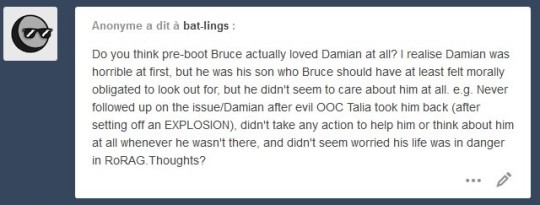
Well, you are both right in that reboot!Bruce puts his preboot counterpart to shame where Damian’s concerned. The thing is, the reboot gave a much bigger place to Bruce and Damian’s dynamic than preboot ever did. Those two actually don’t have that many scenes together in preboot, and said scenes were usually part of a bigger plot/narrative that left little room to focus on their relationship.
I’ll answer this in three stages in order to address everything our Anons mentioned:
Bruce & Damian’s dynamic as portrayed by Morrison
The Resurrection of Ra’s al Ghul
Conclusion: does preboot!Bruce care about Damian? And was he a good father to him? (spoilers: yes and no, respectively.)
The conclusion summarizes everything so jump there if the argumentation part is too long.
A) Morrison’s Damian & Bruce
Disclaimer: I really, really hate Morrison’s writing. I’ll try to be reasonable when criticizing it but be extra aware of that bias. It makes me put most of Bruce’s action on the writer rather than the character and while I have my reasons & probably won’t change my opinion, it’s still a pretty categorical take.
Honestly I think Morrison’s Bruce does feel responsible for Damian. I’m even sure he cares about him too:
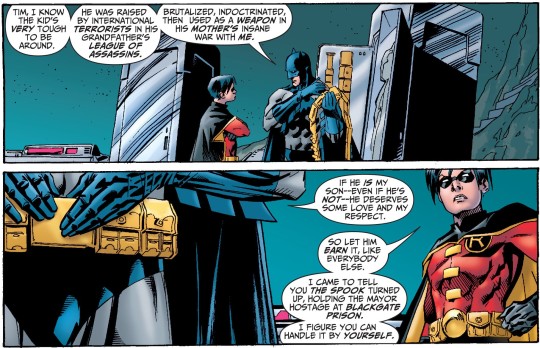
[Batman (1940) #657]
Actually, the whole issue is pretty good where Bruce & Damian are concerned. Must be my favorite thing Morrison has ever written. He installs interesting things character-wise, like Bruce making an extra effort to make Damian comfortable in the Manor & be patient with him, or Damian being an insufferable brat up until Bruce snaps at him, at which point he immediately switches off to “yes sir” in front of that new figure of authority.
Those are interesting bases to construct a dynamic upon. Problem is, they’re not gonna be exploited.
Here Bruce shows clear intent to provide guidance to Damian. But rather than give Bruce the occasion to follow up on that intent, and to develop a real relationship with Damian, Morrison gives us the incident Anon mentioned in the next frickin’ issue : an explosion set by Morrison’s godawful “““Talia””” that should’ve killed both her and Damian, and Bruce staring dramatically into the distance.
Does Bruce investigate their disappearance while Damian is being hardcore abused by his mother? Nah, he’s too busy skiing with one Jezebel Jet– a relationship Morrison needs to install since Jezebel has a notable role in Batman RIP.
My point is: as of #658 Morrison considers this arc finished & that there’s nothing to add. By that logic it’s valid to forget Damian until he’s relevant again plot-wise. It’s not (i think?) a way to tell us Bruce doesn’t care about Damian.
Let’s fast-forward to the disputable editorial & writer choice to launch Batman Inc/Leviathan just after Bruce’s return from the “dead” without A) leaving room for a confrontation/closure scene between him and Damian beforehand; or B) letting them actually interact more than the strictest minimum in said arc. From a strictly in-universe POV though, it’s not ooc for Bruce to decide unilaterally that Damian doesn’t need him or to focus on the crisis to come without talking to his son first.
I guess I should be talking about Batman Incorporated Vol. 2 too, ‘cause while it’s technically N52 it’s very much in the continuity of the storyline Morrison started in preboot. It also has a few Bruce & Damian moments where despite terrible miscommunication Bruce seems to worry for Damian… But then the plot requires Bruce sending Damian back to the mother who, in this dumbass version, abused him all his life.
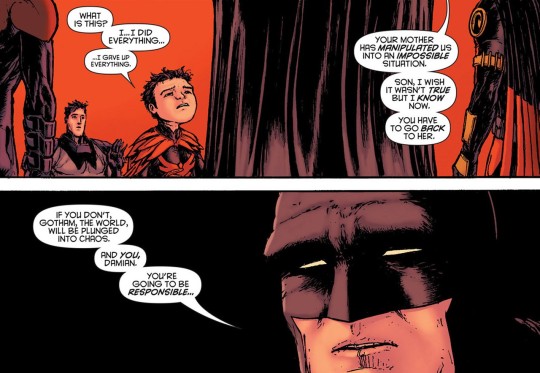
[Batman Incorporated (2012) #4]
If I got that right this is a “Hero must make Big Sacrifice for the Greater Good” moment. The fact that Bruce loves Damian isn’t put into question: it makes the sacrifice more significant.
And that’s kinda my problem. First we’re told that Bruce wants to provide for Damian, but then whatever affection he feels for the boy is sidelined or even sacrificed to other narrative considerations.
So basically Bruce’s love for Damian has no significance in itself. It’s a given that doesn’t particularly need to be illustrated or expanded on; it’s stocked until we need it to breed impact in some scenes. Like the one above or, you’ve guessed it, Damian’s death. So yeah Bruce loves Damian. He loves him so much he’s sad when he dies. Ahem.
All in all it’s not a father-son story: else there would be more banter, slice of life sequences, time for the dynamic to develop, etc. It’s a hero-who-loses-stuff-in-war story. One story isn’t better than the other, they just appeal to different types of audiences.
“Does my father love me” is a personal thus small stake. Batman Inc/Leviathan or “Can I keep this future from happening” are world-wide to city-wide thus big stakes. I think a marked interest in the Big Ideas is what characterizes Morrison’s writing. Thus the portrayal of character relationships has a very specific place in his stories.
Anyway: I don’t think Morrison ever wanted to imply Bruce doesn’t care about Damian. It’s just that he’s a plot-driven writer and that both characters’ interactions & smaller stakes, although somewhat present in his narratives, will always come second in the big schemes of things.
If you consider that Bruce behaving like he does under Morrison’s pen proves he doesn’t give a damn about Damian though, I sure as hell won’t fault you for it.
B) Bruce & Damian in The Resurrection of Ra’s al Ghul
(God re-reading an in-character Talia these days is an oasis in the desert. Gotta love that arc all the more for that.)
Not gonna lie fam. Our two Anons are right when they say Bruce is pretty cold in that one.
But A) Bruce is also dealing with a crisis, which means he’s emotionally removing himself from the situation; B) he’s not treating Damian differently than he is Dick or Tim… which we’ll see is the problem tho.
It doesn’t excuse Bruce’s behavior (I think he’s out of line myself), but I just don’t think it implies he doesn’t care about Damian.
You’ll notice that his apparent aloofness applies to Tim too (and Dick although he’s not mentioned), and that it equally unsettles Talia.
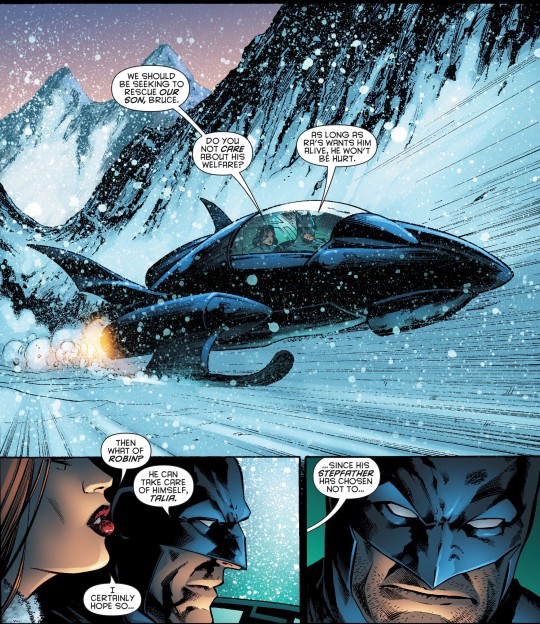
[Nightwing (1996) #138]
I want to stress the apparent in aloofness. On several occasions during RoRAG Talia reproaches Bruce that he’s not confronting his feelings what else is new. I believe he’s worried about the boys, all of them, but he also trusts them to handle themselves. He also thinks that if he so much as voices his worry, he won’t be able to focus and do what he has to. So he represses them and goes fully in Batman-mode.
Fast-forward. When Bruce is barking at Damian to pick up a sword and fight, it’s his way of protecting him– he needs Damian to defend himself.
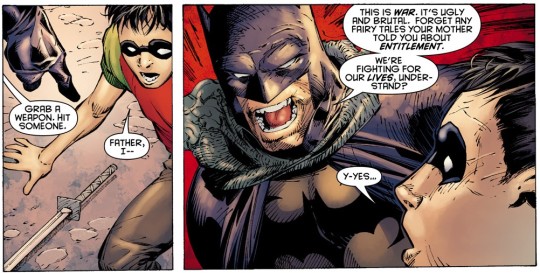
[Detective Comics (1937) #839]
Because it’s not fair to show this without context: 5 seconds before Bruce legit bites Damian’s head off, chill out dude, he goes all protective batdad upon seeing Ra’s trying to steal Damian’s body.
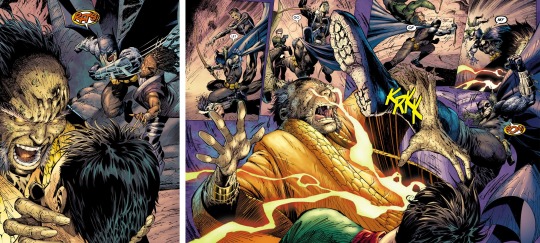
So yeah. I have reasons to believe Bruce is scared out of his mind here. Hence the very aggressive way he tries to shake Damian into action.
So far Bruce gets a pass. It’s afterwards that he deserved to be punched in the face imo, and that’s probably the scene our Anons had in mind:
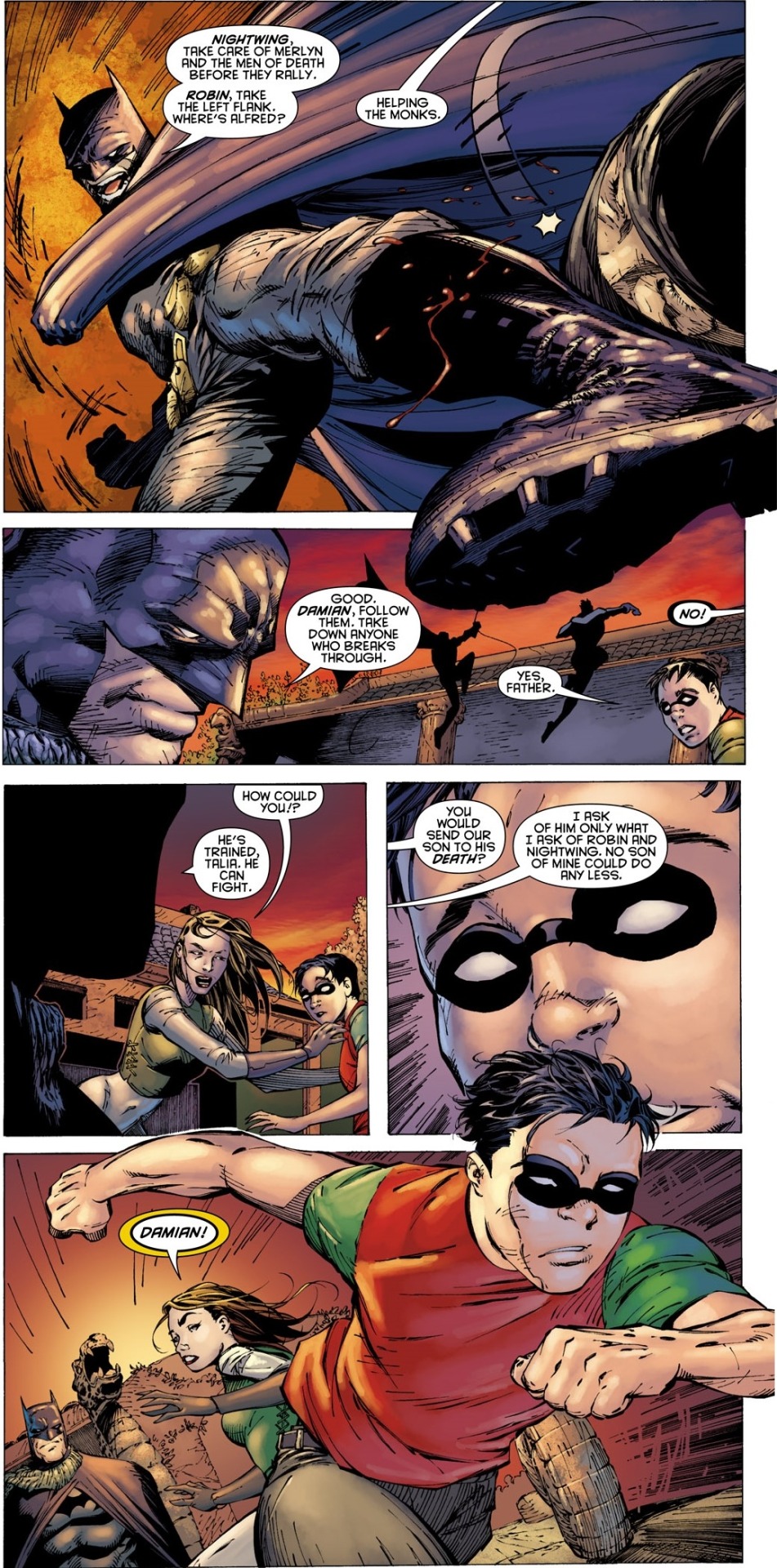
In fact, Bruce is expecting the same from Damian than he’s expecting from his two other sons. To be precise, he’s not treating either of them as sons— they’re on the field, they’re Robin & Nightwing right now. Aka soldiers/partners/teammates rather than family. And Bruce is putting Damian on that exact level when he shouldn’t be.
It’s harsh, and that’s emphasized next to Talia (who is actually written like a Talia). She’s all aggressively worried mother and Bruce’s all cold commander, the contrast is off-putting.
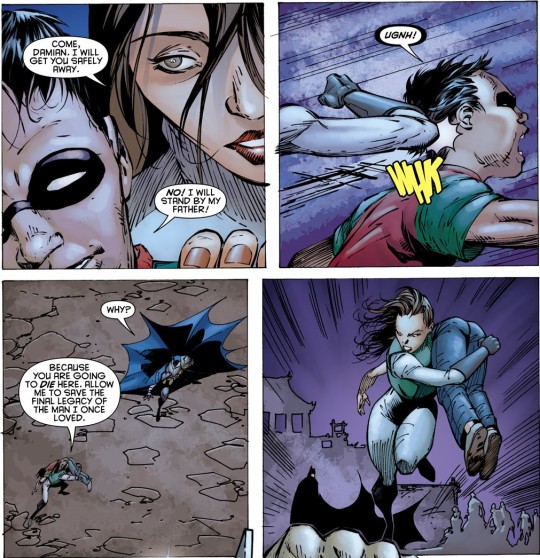
Talia reacts like a mother first by fleeing to save herself and her son. But Bruce can’t let Ra’s to his own devices, and he expect his sons to fight beside him.
It’s unfair to Damian ‘cause he’s not Robin yet, he’s not part of Bruce’s war the way Dick and Tim chose to be, he didn’t choose to be dragged into Ra’s schemes: he’s snapping to attention at Bruce’s order out of a childish need for validation, not out of a conscious & thought-out choice to make this his life. Also he’s ten. Yet those considerations fly over Bruce’s head: right now and unlike Talia, he’s not thinking like a father.
Do I think Dini balances the Greater Good vs Familial Attachment dilemma better than Morrison does? Hell yeah. He took the time to show Bruce ripping Ra’s apart at the beginning of the issue to prove us Bruce cares. And for all that Bruce’s wrong here, Dini has him fighting beside Damian, not sending him off on his own. Talia’s fleeing with her son gives the reader a reality check & puts the validity of Bruce’s choice into question as it should be. The stakes are also so much more concrete that “distant dark future to avoid”.
Next is probably my fave line ever written about Bruce & Damian ‘cause it gives so much sense (or depth) to Bruce’s hands-off approach.
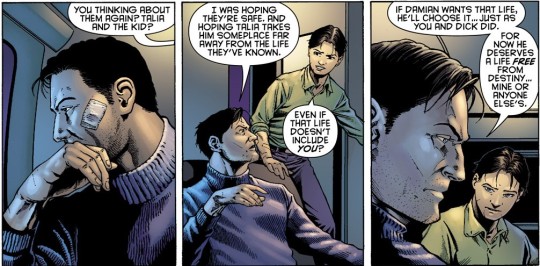
And like. Everything that Bruce says here is true. That’s exactly what Damian’s character arc should be about. But dude maybe try to have a relationship with your son outside of the Batman legacy? The thing is Bruce built his relationships with all his kids through vigilantism and I think he just. Doesn’t know how to do it differently. The idea doesn’t even cross his mind for god’s sake.
By my understanding it’s not that Bruce doesn’t love Damian. It’s that he genuinely believes Damian’s better off without him.
It’s low key confirmed in Bruce Wayne: The Road Home.
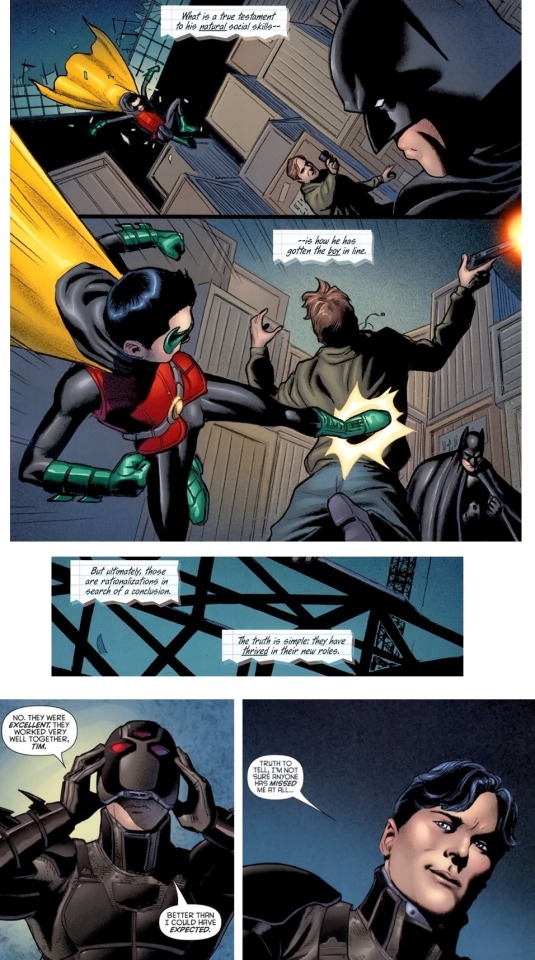
[The Road Home: Batman & Robin]
((Don’t trust anything Bruce says about Dick’s “casualness” or whatever in this issue tho. Nicieza just… doesn’t know Dick’s character all that much.))
So Bruce is basically taking the easy way out, yeah. Both in ‘Tec and in choosing it’s not worth trying to work with Damian as his partner. He decides Talia is a better parent & Dick is a better mentor than he could be, and he’s off fighting the good fight against Leviathan.
We can stretch it and say Bruce probs decided he’ll take care of his relationship with Damian after the Leviathan thing is dealt with but tbh I don’t know if DC or Morrison thought that far ahead.
Conclusion
Morrison’s narrative installs that Bruce does feel morally obligated to care for Damian. And although I get why it can feel uncertain, I’m not sure we’re supposed to doubt Bruce loves Damian.
Bruce not looking for Damian after the explosion is is more due to the writer’s choice to consider the “Damian issue” closed for now so that he can focus on his next plot/installment. I guess.
When Bruce has the idea to send Damian back to fake-Talia, I guess his love for his son is a tool used to show how much Bruce is a selfless hero*. and a terrible dad but he’s a Hero™ so it’s okay.
Bruce in RoRAG doesn’t come as indifferent to Damian’s safety to me, he’s being his dumbass self in a crisis situation. He’s got no excuse for sending Damian alongside Dick & Tim when he did though.
On two occasions Bruce unilaterally elects that Damian is better-off without him. First with the in-character Talia who actually loves her son, second as Dick’s partner.
* Actually it’d be very interesting if someone who liked that comic-book could explain me wtf I didn’t get about its narrative significance. Sometimes our personal tastes just render us blind to some things guys.
TL;DR: Does preboot!Bruce love Damian? Yes. Was he a good father to him? No.
And I’m feeling way more comfortable giving a categorical answer here than when I was asked if Bruce is, in general, a good father.
To be fair Bruce does try to step into a fatherly role in Morrison’s Batman #657, aka just after he meets Damian. Afterwards we get sidetracked; and later storylines just. Don’t really give Bruce & Damian the opportunity so share father-son moments.
His behavior in RoRAG is just plain bad. The fact that it’s not due to indifference doesn’t change that. The ten-year-old who didn’t ask for shit should be treated differently that the seasoned vigilantes Dick and Tim are, period.
Obviously leaving Damian in fake-Talia’s clutches or wanting to send him back to his abuser goes under “bad father points” too. If you consider the whole of Morrison’s run should be integrated into your personal understanding of the character, that is. woops look at that terrible bias showing its ugly face again
In later episodes, it’s tempting to give Bruce a pass by saying that he just didn’t get the chance/time to be a good father to Damian, and part of it is true. But again, failing to invest in that relationship is completely in-character, and tbh it’s the part I find the most interesting character- and narrative-wise:
It’s A) self-depreciating (”Talia or Dick can provide my son what I can’t”); B) self-centered, in that Bruce doesn’t stop to consider what Damian thinks or wants; and C) cowardly, in that the second there’s someone else available to take care of Damian, Bruce stops trying to be a father and to invest himself emotionally because gasp, feelings!
As a comparison, think of how long it took for Bruce to go from mentor-protégé-e to father-child in his relationship with Tim and Cassandra; and to admit that’s how he felt about those kids. He didn’t adopt Dick until he was an adult either. Batdad needs time to un-constipate. It’s a Bruce thing, not a Bruce & Damian one.
(Jason is the only kid with whom Bruce immediately builds a wholesome relationship and that’s where you cry because if Jason didn’t die Bruce wouldn’t have half as much trouble getting close to his kids.)
Hope this word-vomit answers that. Thanks for the asks!
#bruce wayne#damian wayne#batman#dc comics#batfam#batfamily#meta#batdad#dick grayson#tim drake#talia al ghul#ra's al ghul#jason todd#robin#nightwing#red robin#zae chatters#asks#my stuff
412 notes
·
View notes
Note
Okay... Jusoo for the ship ask.
002 | Send me a ship and I will tell you:
When I started shipping them: It was sometime in 2014, but it kicked off when the novel was released. Fujitani used some classic Japanese lit. tropes for expressing feelings that were just.Are you serious?
My thoughts: They’re more a platonic OTP at this point, but I used to ship it romantically. It shifted at the end of the Sei arc and in the intermediary arc when Suwon was revealed as arospec. I view their relationship as a work in progress, with neither one really knowing the other at the start of Suwon’s reign. Then slowly they start to get a feel and then eventually find themselves connected in a “oh god, when did this happen, feelings suck” way. The Sei arc began with an atmosphere where Judo was making his anxieties and concerns clear and setting his foot down on what he was and was not comfortable with. At the same time, Suwon was slowing himself down to make sure Judo was comfortable going into an operation with him, which included calling most of the generals to help them out. It looked like progress had been made on Suwon’s part in allowing someone else to help him make decisions, whereas before it looked he was pulling all the strings himself. Meanwhile, Judo wasn’t just that irritated character who went along with whatever Suwon planned anymore, and I loved that. Of course, that new autonomy is what paved the way for him to nearly destroy the stability of the tribes’ unity because he was so focused on keeping Suwon safe, which ironically was the thing he had been worried about the most and accomplished the exact opposite of what he was aiming for. I’m disappointed that it never had some kind of follow-up. It’s an OTP. I’m thirsty as crap for any interaction between them now. Man, I was spoiled before the Sei arc ended.
What makes me happy about them: I like how they still manage to have informal moments between themselves. I like how Suwon stops all of Geun-tae’s teasing about Judo being single by flat out stopping it or diverting from it because that was getting old, like, yesterday. I like Judo’s loyalty to Suwon and I’ll be kinda (really) irritated if canon pulls an “everybody sides with Yona in the end” gig with him. (The only thing that would make this work for me is if Suwon does the same thing.) UNDER.THE.SAME.MOON.
What makes me sad about them: “If you want to die, then do it after you’ve accomplished your goal!” combined with the Hana to Yume editorial note “I chose you as my master. I will follow you to the end.” …Combined with Suwon’s “I don’t plan on living a happy life.” inner monos. You two really don’t have to go down this road. Just go traveling after this is all over, shit.
Things done in fanfic that annoys me: Only 4 people through the years have written stuff for this, so there’s not a lot of be annoyed with, if anything.
Things I look for in fanfic: Judo given more characterization than just “that one angry fella”. It’s fanfic. We can do whatever we want.
My wishlist: The miracle of communication, a small arc, extras with just them
Who I’d be comfortable them ending up with, if not each other: I’m not sure. In a romantic sense I don’t have anything for Suwon, but I can see Suwon/Lili as being an alternative to this “life partners” thing (it’d be way more healthy). Maybe Judo/Ayura being an aesthetic thing?
My happily ever after for them: Lili to shout them out for being idiots and lock them in a room where they just talk. Because I feel like the breakdown at the end of Sei really was just a matter of miscommunication, and I feel like if they get some things sorted out after this canon break they’ve had (re: Yona and Hak), they can come back better than before. Also, traveling together in the end. No dying for you two.
4 notes
·
View notes
Text
Review: The Prestige by Christopher Priest

Genre/Tags: Science Fiction, Fantasy, Split Narrative, Unreliable Narrator, Memoir, Journal, Stage Magic, Historical Fiction, Horror
Warning(s): Child death, miscarriage (unrelated), suicidal ideation, self-harm
My Rating: 3/5 (Somewhat Recommended)
**Minor Spoilers Follow** (Unusually long review!)
“I step forward to the footlights, and in the full glare of their light face you directly.
I say ‘Look at my hands. There is nothing concealed within them.’
I hold them up, raising my palms for you to see, spreading my fingers so as to prove nothing is gripped secretly between them. I now perform my last trick, and produce a bunch of faded paper flowers from the hands you know to be empty.” -Alfred Borden
An Aside: The film The Prestige (dir. Christopher Nolan) was based off of this book! The movie is honestly one of my favorites ever and certainly my favorite Nolan film; it’s a concise and harrowing tale of obsession and revenge and how it consumes the two main characters, all wrapped together with a strong cast, interesting twists, and a good nonstandard setting. Definitely my kind of story.
Obviously it’s impossible not to compare the two, and I know some of that will come across in my review. That being said, I strongly believe that adaptations are different for a reason and should be judged on their own merits, so my base review will only cover the book and my impressions of it. You can probably tell, however, that I preferred the film purely from the rating. I will write more about how the two compare near the end. This review is a bit longer than usual for it.
My Summary: An investigative journalist named Andrew, adopted at a young age, is sent to research a local cult holed up in an abandoned estate owned by the Angier family. In doing so, he meets a woman named Kate Angier, who recognizes him from childhood. It turns out their ancestors, Rupert Angier and Alfred Borden, were two feuding stage magicians in the late 1800s, and the bad blood between the two families has spilled out into modern times. While Andrew doesn’t particularly care about the family that abandoned him, he gets the sense that his long-lost twin is calling out to him from somewhere and compelling him to stay, and he learns the history of the feud.
From there the narrative shifts to a memoir by Alfred Borden which exposits notable facts of his life, including what got him into stage magic and an immense secret which influences everything he does, including how he pulls off his most famous trick, The Transported Man. He also documents an ongoing rivalry between himself and fellow magician Rupert Angier, and the latter’s constant attempts to one-up him, leading to a climactic and uneasy final encounter between the two, with supernatural elements to it.
An interlude narrated by Kate comes in the middle which reveals an Uncomfortable Detail about her childhood and connection to Andrew. Some supernatural stuff is implied. Then, the story shifts to a narrative from the point of view of Rupert Angier, this time in the form of a journal. Similar to the first half, it goes over Rupert’s life and history, and the circumstances the rivalry between him and Alfred. It documents his attempts to surpass The Transported Man, a trick he obsesses over. It is also noteworthy in that mutual scenes between the two are not the same, implying unreliable narration on part of one or both men. Their rivalry eventually comes to a head.
The Good:
Features a strong voice. It felt like both halves of the story were solidly rooted in their time period and I never felt “taken out” by the phrasing and language of the two protagonists. It ultimately felt interesting to read.
Parallels between the two halves of the story are interesting and satisfying when they occur. It was interesting to flip back and forth between certain scenes and see what was different between them, and try to piece together who was telling the truth. I haven’t run into many books that do that.
The story is obviously well-researched; Priest has a working knowledge of stage magic and the general economic climate of late-1800s London (and, to my surprise, Colorado history, which I’m familiar with). When the characters describe their acts, it has a lot of depth which makes them come across as convincing professionals.
The core concept itself is really quite interesting; it’s an odd conflict and time period to pick, but it pays off in a lot of ways. The choice to use unreliable narrators in a story about stage magic is brilliant.
Of all things the story reminded me heavily of Frankenstein, particularly the way the book describes the supernatural/science-fictioney elements and how it plays into the lives of both men. I could appreciate the references it dropped.
The choice to do a pure half-and-half split narration was risky, but I think it paid off and ended up more effective than just threading the two stories together in alternating chapters. As I mentioned above, I liked that I had to flip between the two. You take what Borden says in the first half for granted– after all, why lie about it?– but the inconsistencies between him and Angier are an intriguing and come much later. (I’d prefer it if the book DIDN’T mention this directly, but unfortunately…)
The Mediocre:
While I liked the split narrative, having the halves be purely autobiographical or journalistic ultimately bogged the story down. By its nature a journal contains a lot of fluff that doesn’t necessarily connect to the story. It felt like Priest was trying to be “authentic” by including a lot of life details that end up… ultimately irrelevant? It detracted a lot from my experience because I had zero reason to care about those things and they served no purpose to the story.
As a result of the above issue, the events of the story felt episodic and disconnected, not a part of some overarching and connected feud. Especially in a story that relies on subterfuge and deception, things that might seem irrelevant should reflect in a new light as the story progresses. The first half accomplishes this in some ways, but it falls apart in the second half.
It had an annoying tendency to foreshadow a twist, reveal it, backtrack and reveal the twist to be “impossible” then… go back to it? Just kind of an irritating bait and switch, generally. Twists work with this type of story due to the whole stage magic thing but that gimmick completely goes against the attitude of it.
The framing device with the modern characters seems ultimately pointless. The story would have been fine without it. It would also prevent that… ending. See the final point under “The Bad”.
The Bad:
The characterization was lacking. There are a lot of people that come into the story and leave virtually no lasting impression on it, which isn’t a good sign. The big problem here is with this type of story, characters SHOULD be the driving force, and they simply aren’t. I get that the story focuses on the main two, but it shouldn’t be to the exclusion of all else.
And I really hate to say it, but the main characters were not especially interesting. A memoir and a journal by nature have a laser focus on one specific person, and while that was true enough, the characters don’t really change all that much. Both Borden and Angier are self-important assholes. That’s fine. The problem is they stay that way the entire story and refuse to examine themselves or develop in any concrete way until the very last second. Even when a character has a moment of reflection, like “this feud is stupid we should just end it”, something contrived keeps it going and neither character grows or matures from the insight. If this is intentional, it’s a frustrating position to put your reader in.
The conflict ultimately makes no sense. The feud is founded on stupid reasoning, and the way it sustains itself seems unrealistic. Even when a spoiler event happens that gives a character EXCELLENT motivation to push the story along and solidify the feud (possibly justifying this story built, ultimately, on miscommunication), it gets resolved in three pages and then the feud just… continues for no reason? If the feud is intentionally pointless, then play that up more! Show it through the side characters, or the modern framing device, or something. It feels bad otherwise.
I’m just going to say it. The ending is stupid as hell. Just really fucking dumb. Yeah, let’s turn this into a supernatural horror story… randomly? It makes no goddamn sense with the rest of the book. It felt like a joke ending. Nothing really set it up beyond the science fiction elements of some of Tesla’s stuff and even then it went in a way different direction. If the rest of the book had been like that, sure, but it wasn’t.
Final Thoughts: The Prestige is a book that features a fascinating core concept. Rival stage magicians at turn-of-the-century London trying to one-up each other and how they ultimately go too far? Frankenstein style science fiction? Nikola Tesla features prominently? But to me it fell short– it’s the type of book that could be great with a stronger editorial hand clipping out unnecessary fluff and bolstering the characters. The movie accomplishes this! It’s just a shame it couldn’t happen with the… book it’s based on.
That doesn’t mean the book is bad– far from it. It obviously came up with the framework that made one of my favorite films, and I liked seeing connections between the two. Again, I have to stress that it’s well-researched and an interesting idea, and the writing quality is good even if it falls short on storytelling. The idea of having unreliable narration for a story about stage magic is goddamn brilliant and I’m glad the author went for it. I just think he jumped the shark.
A lot of my complaints with the book are solved in the movie adaptation. It’s ironic that a book that has so much more time and space to develop characters falls flat, but the shorter movie version doesn’t. A story about obsession, one-upmanship, and how revenge destroys a person when they go too far should be character-driven and the movie understands this. The feud between Angier and Borden is caused by a stronger and more personal event, and you start off rooting for Angier. However, as the story progresses, Angier’s willingness to go to further and further extremes switches sympathy to Borden. Even more important are the side characters, their arcs, and seeing how they react to each man’s obsessiveness, and how it tears everyone apart on an interpersonal level. It’s raw and it’s structured well; everything is relevant, which makes the twist at the end all the more satisfying. You get a more concise and philosophical story overall, and I feel it’s way more appealing that way. The ending is also much different and much, much less stupid– I cannot stress this enough.
So ultimately I’m glad this book exists because it gives us an excellent story– one that only reaches its full potential in the adaptation. If it weren’t for that egregiously bad ending then maybe it would be a 3.5 (I’d penalize it more based on that but… ehh). You can certainly read it if you want to for the good aspects of it, but you should probably just watch the movie. If you want a story about rivalry gone too far, I’d recommend Vicious by V.E. Schwab or Oryx and Crake by Margaret Atwood, both of which are character-driven with fascinating (and consistent) premises.
13 notes
·
View notes